Unit 2 Section B 1a-1e)
人教版英语八年级上册Unit2 SectionB(1a-1e)优质课教案

P4-2b recorder
Step2
Play the recorder
Check the answer
Listen and finish2b Give the answers
P4-2b recorder
Step3
Show the target language :
to others.
Pairwork
Step5
Move around the room and give
support as needed.
Talk to each other
Step6
Ask pair of Ss to show their works.
Pairs of Ss show
their work
How often do you exercise?
Use the target language, and talk
to others.
Pairwork
Step4
Show the target language:
I exercise everyday.
Use the target language, and talk
Textbook
Task 1: Pairwork:How often do you drink milk?
Aim
To be familiar with the target language and the key words
1
Show the target language:
How often do you drink milk?
人教版八年级英语上册Unit2SectionB(1a-1e)教案设计

Unit2 Section B(1a-1e)优质课课件(安徽省)人教英语八年级上Unit2 Section b1a-1e教学设计来安县水口中学杨成扣一、教学日标:1、能够掌握课标要求的“四会”词汇:junk,coffee,health。
2、学会谈论饮食习惯,了解哪些饮食习惯是健康的。
3、能阅读关于介绍饮食习惯方面的文章。
学会养成良好的生活习惯和饮食习惯。
4、培养学生的逻辑表述能力,激发学生的积极思维,并使学生互相了解,增进友谊。
二、学情分析:对于本单元的一般现在时态,学生掌握较好,部分学生在本章节的听力部分略有不足,建议多听多练练。
三、重点和难点:1、区分how many/how much,health/healthy,different/difference2、掌握以下重点句子How often do you eat fruit?How many hours do you sleep every night?How often do you eat junk food?How often do you drink coffee?四、教学过程Step 1 Lead-in(导入)Greeting & free talkStep 2 Match the pictures(1a)Let students pay attention to the pictures. Say something about the pictures. Match the words with the pictures. Check the answers and then practice reading.Step 3 Ask and answer(1b)Pair workT: Now look at the conversation in lB, ask two students to read it o the class.Work with your partner. Please make your own conversations using the words in la. Forexample:A: How often do you eat vegetables?B: I eat vegetables every day.A: Do you like it?B: No. But my mother wants me to eat it. She says it is good for my health. Then ask some pairs to present their conversations to the class.Explanation:Pay attention to the conversation in the box on the right. Read it to the class. Explain the phrases “be good for” means “有益于,,;对,有好处”Work in pairs. Choose a new partner. Use the words in la to make conversations Share the student’s conversations.Step 4 listening (&c 1d)1cT:Now you will hear a reporter interviewing two people. Tina and Bill. Read the two names for the students. In lc, we’ll know who is health, Bill or Tina? Read the questions in lc. Listen to the tape carefully twice.Circle “Yes” or “I don’t know” in the chart.1d1. Before we check the answers in Ic ll we read through the questions in ld. Pay attention to Tsnaand Bills answers.2. Play the tape again. This time, if we have heard one question, we will have a pause. Make sure Tsnaand Bills answers.3. From the answers in ld, ask the questions: Who is healthy, Bill or Tina?Step 5 Pair work(le)Student a is the reporter. Student b is Tina or Bill. Ask and answerquestions. Then change roles.Step6 Summary (课堂小结)Tell the students the difference of how many & how much,heath & healthy1. Fill in the blanks with how many or how much①—______ is the book?—It’s $10.②—______ students are there in the classroom?—______10.2. Fill in the blanks with health or healthy①Fruit and vegetables are ______ food.②Exercise is good for ______.Step7 Exercise(练习)单项选择1. I like English very much, so I ______ listen to the tape in morning.A. usuallyB. hardly everC. neverD. hardly2. What does your father do in the evening?—He usually ______.A. watch TVB. exercisesC. read booksD. go for a walk3. ______ do you go skating?—Every day.A. How oftenB. How manyC. WhenD. What time4. ______ does he do sports every day?—He does sports for two hours every day.A. How manyB. How oftenC. How longD. How soon5. ______ give up,then you can be successful.A. AlwaysB. SometimesC. NeverD. Usually6. ______ do you go to the bookshop?Once a week.A. How longB. How manC. How oftenD. How much7. Everyone knows girls ______ sweets.A. usually likesB. likes usually.C. usually1ikeD. like usually8. He too busy. He hardly ______ watches TV.A. oftenB. usuallyC. neverD. ever9. She ever y strict,but ______ kind to us some times.A. sometimesB. some timesC. some timeD. some times10. Jim never late for school, ______?A. is heB. is sheC. does heD. he doesStep8 Homework(作业)Writing:My Eating Habit。
八年级英语上册课件(人教版)Unit 2 Section B(1a1e)

二、按要求完成下列句子。 1.Does your uncle eat vegetables every day?(作肯定回答) Yes,___h_e__d_o_es____. 2.Mr.Smith sleeps seven hours every night.(对画线部分提问) _H_o_w__m__a_n_y_h_o_u_r_s_does Mr.Smith sleep every night? 3.My grandma exercises in the park every afternoon.(对画线部分提问) __W__h_a_t_d_o_e_s___your grandma ___d_o____in the park every afternoon? 4.He goes to the park three_times_a_week.(对画线部分提问) _H_o_w__o_f_te_n__does he go to the park? 5.Mark always helps with housework at home.(改为否定句) Mark _n_e_v_e_r_h_e_l_p_s_with housework at home.
4.—What would you like? —A cup of ________,please. A.bread B.beef C.potato D.coffee 5.A ________ breakfast is good for your ________. A.health;healthy B.healthy;health C.healthy;healthy D.health;health
五、从方框中选择合适的选项补全对话。
1
234
5
D AGB E
Unit2SectionB(1a-1e)教学设计2022-2023学年(五四学制)八年级下册英语
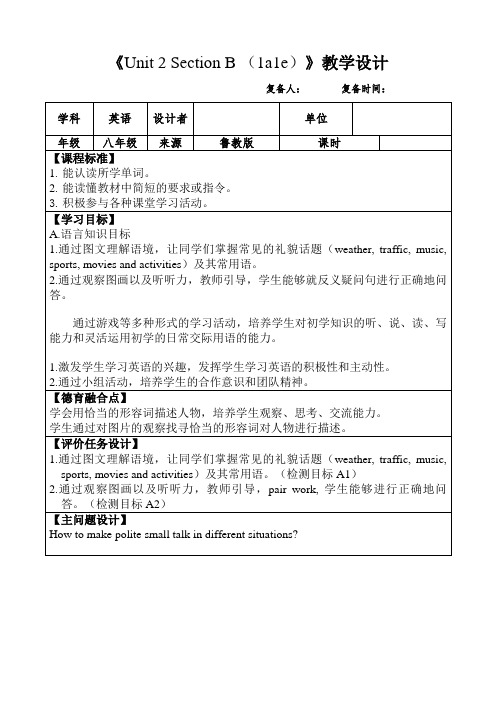
【主问题设计】
How to make polite small talk in different situations?
【教学活动】
Step I. Warming up & lead in
1.Brainstorming:Think about the topics we can talk in a small talk.
2.通过观察图画以及听听力,教师引导,学生能够就反义疑问句进行正确地问答。
通过游戏等多种形式的学习活动,培养学生对初学知识的听、说、读、写能力和灵活运用初学的日常交际用语的能力。
1.激发学生学习英语的兴趣,发挥学生学习英语的积极性和主动性。
2.通过小组活动,培养学生的合作意识和团队精神。
【德育融合点】
《Unit2SectionB(1a1e)》教学设计
复备人: 复备时间:
学科
英语
设计者
单位
年级
八年级
来源
鲁教版
课时
【课程标准】
1.能认读所学单词。
2.能读懂教材中简短的要求或指令。
3.积极参与各种课堂学习活动。
【学习目标】
A.语言知识目标
1.通过图文理解语境,让同学们掌握常见的礼貌话题(weather, traffic, music, sports, movies and activities)及其常用语。
2.Listen again to match questions with the correct answers.
3.Listen and repeat.
Step . Postlistening
英语人教版八年级上册unit2Section B 1a-1e教案
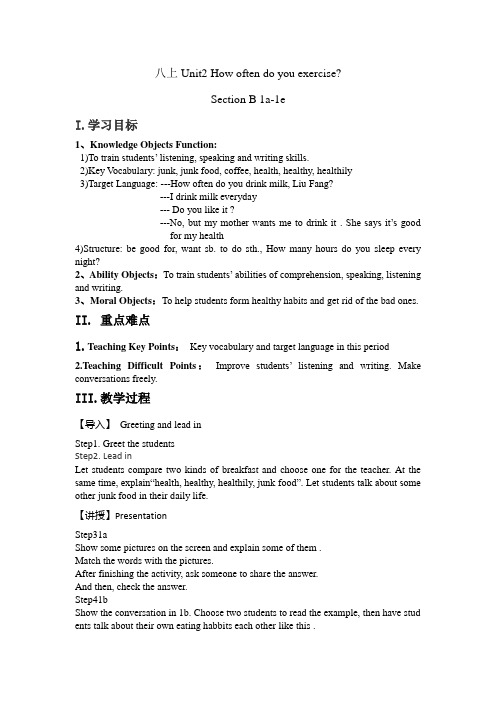
八上Unit2 How often do you exercise?Section B 1a-1eI.学习目标1、Knowledge Objects Function:1)To train students’ listening, speaking and writing skills.2)Key V ocabulary: junk, junk food, coffee, health, healthy, healthily3)Target Language: ---How often do you drink milk, Liu Fang?---I drink milk everyday--- Do you like it ?---No, but my mother wants me to drink it . She says it’s goodfor my health4)Structure: be good for, want sb. to do sth., How many hours do you sleep every night?2、Ability Objects:To train students’ abilities of comprehension, speaking, listening and writing.3、Moral Objects:To help students form healthy habits and get rid of the bad ones. II. 重点难点1.Teaching Key Points:Key vocabulary and target language in this period2.Teaching Difficult Points:Improve students’ listening and writing. Make conversations freely.III.教学过程【导入】Greeting and lead inStep1. Greet the studentsStep2. Lead inLet students compare two kinds of breakfast and choose one for the teacher. At the same time, explain“health, healthy, healthily, junk food”. Let students talk about some other junk food in their daily life.【讲授】PresentationStep31aShow some pictures on the screen and explain some of them .Match the words with the pictures.After finishing the activity, ask someone to share the answer.And then, check the answer.Step41bShow the conversation in 1b. Choose two students to read the example, then have stud ents talk about their own eating habbits each other like this .Students share their dialogues.Step51c-1d1.First, intruduce Tina and Bill to the students, tell them they will hear a reporter inter view Tina and Bill .Ask students to read the sentences in the chart together and explai n some key words to make sure they understand each sentence.2.Listen to the recording and fill in the blanks in the survey about how often Tina and Bill do the things .Then check answers .3.After that, let students say who has good habits.【活动】Play a gameStep61ePlay a game. Let students use one sentence to talk about their own lifestyles. Show so me structures on the screen.Step7 Tell students the importance of health and how they can live a healthy life. 【练习】PracticeStep 8 Exercise1.I hardly exercise so I think I'm kind of _____.A. healthyB. healthC. unhealthyD. unhealth2.My sister likes fruits_____ she doesn't like vegetables.A. andB. butC. orD. also3.Jim's parents want him ______ fruit.A. eatingB. eatC. to eatD. eats4.---What does your father do in the evening?---He usually _______A. watch TVB. exerciseC. reads books5.---_______ students in your class are fromBeijing?____Only one.A.How oftenB. How manyC. How much【测试】Test1.--你多久喝一次牛奶?--我每天都喝。
Unit2SectionB(1a-1e)(词汇+语法)人教版英语七年级下册

Unit 2 What time do you go to school?Section B (1a-1e) (词汇+语法)一、根据句意和首字母或汉语提示填单词。
1.It is half p nine now.2.We have English at a q past ten in the morning.3.What time do you do your (家庭作业)?4.Mike often (跑步)after dinner.5.Can you help me (打扫) the classroom?二、根据句意和汉语提示写出所缺的单词1. I have too much _______(家庭作业) to do.2. Let’s ______(跑步) after school.3. My mother _______(打扫) our room every day.4. They _______(步行) to school every day.5. Let’s go to the bus station ________(迅速地).6. _______(有时) he eats lunch in the restaurant.三、根据句意及首字母或汉语提示完成句子1.My grandfather takes a w after dinner every day. He thinks it is good for his health.2.Your room is dirty(脏的). Please c it after breakfast.3.Fifteen minutes is one q.4.She often finishes(完成) her (家庭作业) on time.5.Can you (跑;奔) as fast as Mike?四、用括号内所给单词的适当形式填空1. The apple is too big. My mom cuts it into (half).2. A (quarter) of the students in our class are girls.3. If you help me do (I) homework, I’ll buy you dinner.4. My father is good at sports. He likes (run) every day.5. The baby is just learning (walk).五、根据句意和首字母提示写出所缺的单词1. It’s half p six. It’s time to get up.2. It’s nine thirty. That is to say, it’s h past nine.3. E you or your sister can go with us.4. The cake t nice. Would you like to try it?六、根据句意及所给汉语提示,写出句中所缺单词。
人教版八年级英语上册Unit 2 Section B (1a-1e)精品课件

【拓展延伸】
be good at be good to
擅长……
后跟名词、代词或动词-ing作宾 语,同义短语为do well in“在……方面做得好”。
对……友好
相当于be friendly to, 后面一般 接人。
善于应
be good with
付……的; 对……有办
后接sb.或sth.。
法
3. She says it’s good for my health. health n. 健康;人的身体(或精神)状态 health作不可数名词,常用短语: be in good/poor health身体好/差。
A: How often do you exercise? B: I exercise every day. A: And how often do you …?
1. How often do you eat vegetables? 2. How often do you eat fruit? 3. How often do you eat fast food? 4. How often do you exercise? 5. How many hours do you watch TV every week? 6. How many hours do you usually sleep at night?
While-listening
1c Listen to an interview about two people's daily habits. Circle your answer to each question.
Does Tina have good habits? Yes. No. I don't know. Does Bill have good habits? Yes. No. I don't know.
Unit 2 Section B1a-1e 22-23人教版七英语下
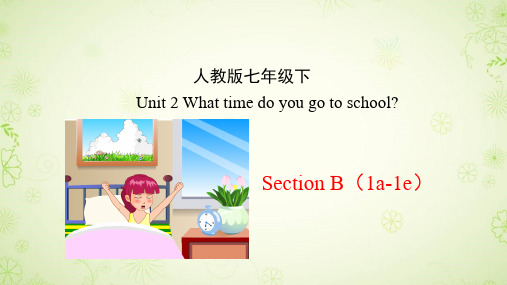
night
AM和PM AM表示“午前,上午”(午夜12:00后至 中午12:00前);PM表示“午后,下午” (中午12:00后至午夜12:00前)。在使用 中,常用小写形式,am和pm。在美式 英语中,实用形式为a.m.和p.m.
1a When do students usually do these things? Match the actions with the time
3. —When do you get up?你什么时候起床? —Usually about half past five. Then I run at six o’clock. 通常大约在五点半起床。然后我在六点钟跑步。 past用于逆读法表示三十分钟以前的时间,英语中 用half表示半小时。英语中整点用o’clock表示。
8. eat dinner7_:1_5_
3. eat breakfast_7_:0_0_ 9. take a walk ___
4. go to school7_:4_5_ 10. go to bed9:0_0__
5. go home4_:1_5_
6. do my homework5_:_3_0
Short-term memory test: Fill in the blanks.
A: When do you usually get up? B: I usually get up at 5:30.
整点读法
ten o’clock
six o’clock
eight o’clock
顺读法: 先时 后分
four ten
three fifty
five thirty-five
eight twenty
人教初中英语八年级上册Unit2Section B (1a—1e)-课件
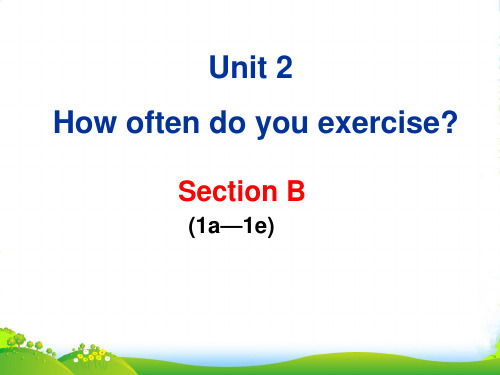
The words: junk food milk fruit vegetables coffee
1d Listen to an interview about daily habits and fill in the blanks in the survey.
……
Frequency adverbs:
(频度副词)
always usually often sometimes hardly ever never
Practice
Use the words about exercise and frequency adverbs to make a conversation.
Tina
every day every day
nine every day
Bill
hardly ever never
nine
never
5.How often do you eat junk food? 2or 3 times a week 3or4 times a week
6.How often do you drink coffee?
Does Tina have good habits? Yes. No. I don’t know. Does Bill have good habits? Yes. No. I don’t know.
never
4times a day
Who has better eating habits? Whose lifestyle is better? Why?
Tina has better eating habits.
新目标(人教)七年级下册英语教学课件 Unit 2 Section B(1a-1e)

(在)周末
Student 1 Student 2
Student 3
Name: ____ Name: ____ Name: ____
get up on weekends exercise eat dinner take a shower go to school
Finish the table in 3c and give your report like this.
usually; never. ➢ Key sentences:
1. What time do you get up on school days? 2. Anna never eats breakfast. 3.When do your friends exercise ? ➢To learn to use adverbs of frequency and ask about times.
What time does Rick eat breakfast?
He eats breakfast at seven o’clock.
When does Scott go to work?
He always goes to work at eleven o’clock. He’s never late.
When do your friends exercise? They usually exercise on weekends.
Question 1:when 和 what time 区别
what time和when都是就时间 提问,它们的回答有何异同?
what time问题的回答仅仅为时刻, 而针对when问题的回答还可以是 更加笼统的时间,如: on weekends, in the morning等。
人教版小学英语八年级上册Unit2 Section B(1a-1e)教学教案及教学反思

4. Read the new words and phrases.
引导学生头脑风暴列出健康食品,通过图片,学习与健康食物、垃圾食品相关的单词和短语,导入课本1a。
Step 3
Presentation
Unit 2 How often do you exercise?
SectionB(1a-1e)
want sb. to do,
be good for,
have good habits,
eat junk food,
eat healthily,
have a good living habit.
- How often do you drink milk?
人教版小学英语八年级上册Unit2 Section B(1a-1e)教学教案及教学反思
教学基本信息
学科
English
学段
初中
年级
八年级
单元
Unit 2
课题
How often do you exercise?
总课时数
6
课时
Section B
(1a-1e)
课型
听说课
授课时间
教学目标及教学重点、难点
教学目标:
引导学生用回答问题的方式谈论关于习惯的问题。
Step 2
Lead-in
(PPT 4-7)
1.Lead Ss tobrainstorm. List some kinds of healthy food.
2.Make Ss look at the pictures and learn the healthy food.
人教版英语七年级下册Unit 2 Section B 1a--1e教案设计
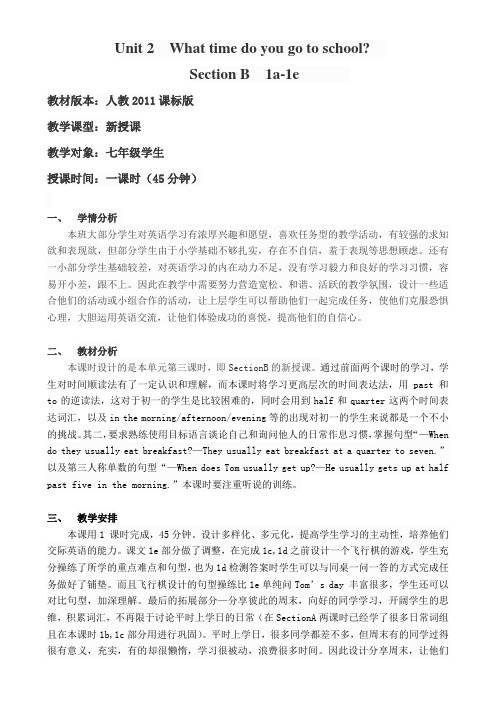
Unit 2 What time do you go to school?Section B 1a-1e教材版本:人教2011课标版教学课型:新授课教学对象:七年级学生授课时间:一课时(45分钟)一、学情分析本班大部分学生对英语学习有浓厚兴趣和愿望,喜欢任务型的教学活动,有较强的求知欲和表现欲,但部分学生由于小学基础不够扎实,存在不自信,羞于表现等思想顾虑。
还有一小部分学生基础较差,对英语学习的内在动力不足,没有学习毅力和良好的学习习惯,容易开小差,跟不上。
因此在教学中需要努力营造宽松、和谐、活跃的教学氛围,设计一些适合他们的活动或小组合作的活动,让上层学生可以帮助他们一起完成任务,使他们克服恐惧心理,大胆运用英语交流,让他们体验成功的喜悦,提高他们的自信心。
二、教材分析本课时设计的是本单元第三课时,即SectionB的新授课。
通过前面两个课时的学习,学生对时间顺读法有了一定认识和理解,而本课时将学习更高层次的时间表达法,用past和to的逆读法,这对于初一的学生是比较困难的,同时会用到half和quarter这两个时间表达词汇,以及in the morning/afternoon/evening等的出现对初一的学生来说都是一个不小的挑战。
其二,要求熟练使用目标语言谈论自己和询问他人的日常作息习惯,掌握句型“—When do they usually eat breakfast?—They usually eat breakfast at a quarter to seven.”以及第三人称单数的句型“—When does Tom usually get up?—He usually gets up at half past five in the morning.”本课时要注重听说的训练。
三、教学安排本课用1 课时完成,45分钟。
设计多样化、多元化,提高学生学习的主动性,培养他们交际英语的能力。
Unit2SectionB1a-1e课件人教版八年级英语上册

As for junk
food times a week times a week All in all, we should keep a
Drink coffee
never four times a dheaaylthy habits like Tina. It can
help us live better.
Presentation
fruit and vegetables every day
How often do you eat fruit and vegetables?
I eat fruit and vegetables every day. For me
Very good! It’s good for your health.
Know about the healthy living or eating habits(饮食习惯) and write an article about their own habits.
Improve the awareness(意识) of healthy life.
Lead in
[ˈstʌməkeɪk] I had a stomachache(胃疼) this summer vacation. The doctor told me I was ill(生病的) because of my unhealthy habits. And he asked me some questions about my habits. Let’s have a look my eating habits together.
ourselves well.
Bill’s lifestyle(生活方式) isn’t healthy, right? Can you give some advice(建议) for him? He should:
Unit2SectionB(1a-1e)课件人教版英语八年级下册

How does the bike look in the picture? It looks new.
What does the boy on the left do with the bike? He fixed up the bike.
1c Listen and number the pictures [1- 4] in
put away 把……放好
1b Match the phrasal verbs with the nouns.
run out of take after
fix up give away
my bike money my father old clothes
1b Then make sentences with the phrases.
JimmyI guess so. But now I’ve_r_u_n__o_u_t_o_f_ money, so I can’t
buy__a_n_y_m__o_r_e_ old bikes. Man: Oh, that’s too bad.
be proud of 为...自豪
Jimmy:Yeah. I need__to__c_o_m_e__u_p__w_i_th__ some way of getting
已经用完...
Listen once again and fill in the blanks.
Man: This morning I’m talking with a very _w_o_n_d__er_f_u_l_ young man, Jimmy the Bike Boy. Good morning, Jimmy. Jimmy:Good morning. Man: So, Jimmy, tell our listeners what you do. JimmyWell, I find or buy old bikes that_n_o_b_o_d__y wants. Then I _f_ix__u_p__ the bikes and_g_i_v_e_t_h_e_m__a_w_a_y_ to kids who don’t have enough money _to__b_u_y___ their own bikes. Man: That’s fantastic. What gave you the idea?
八年级下册英语Unit 2 Section B1 (1a-1e)
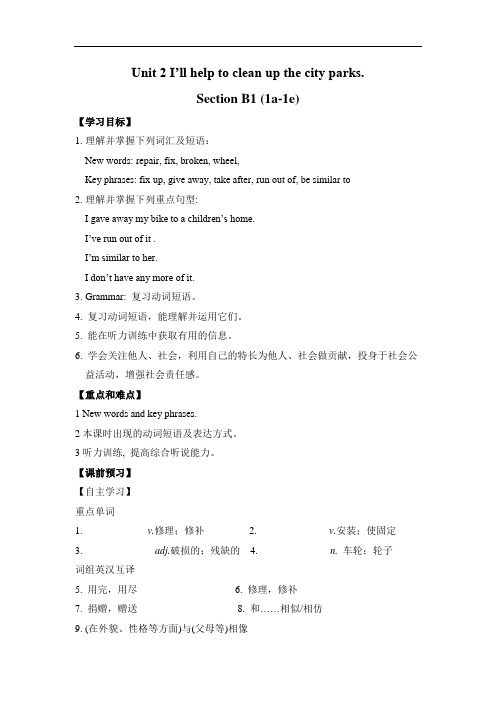
Unit 2 I’ll help to clean up the city parks.Section B1 (1a-1e)【学习目标】1.理解并掌握下列词汇及短语:New words: repair, fix, broken, wheel,Key phrases: fix up, give away, take after, run out of, be similar to2.理解并掌握下列重点句型:I gave away my bike to a children’s home.I’ve run out of it .I’m similar to her.I don’t have any more of it.3.Grammar: 复习动词短语。
4. 复习动词短语,能理解并运用它们。
5. 能在听力训练中获取有用的信息。
6. 学会关注他人、社会,利用自己的特长为他人、社会做贡献,投身于社会公益活动,增强社会责任感。
【重点和难点】1 New words and key phrases.2本课时出现的动词短语及表达方式。
3听力训练, 提高综合听说能力。
【课前预习】【自主学习】重点单词1. ____________ v.修理;修补2. ____________ v.安装;使固定3. ____________ adj.破损的;残缺的4. ____________ n. 车轮;轮子词组英汉互译5. 用完,用尽____________6. 修理,修补____________7. 捐赠,赠送____________8. 和……相似/相仿____________9. (在外貌、性格等方面)与(父母等)相像____________10. sell bicycles ____________ 11.give away bicycles___________ 【合作探究】Step Ⅰ. Lead inPlease complete the sentences according to the pictures with phrasal verbs!He has run out of money.The girl takes after her mother.They gave away some books.He fixed up the bike.Step Ⅱ. Presentation1. Learn the new words.(1)repair v.修理;修补(2)fix v.安装;使固定(3)give away 赠送;捐赠(4)wheel n.车轮;轮子2. Read and try to remember the new words.3. Work on 1a. Match the sentences with similar meanings.探究一1. I take after my mother. 我长得像我妈妈。
人教版九年级英语全册第2单元SectionB《1a-1e》听说课课件

1c Listen and fill in the blanks.
1. Many people make their h__o_u_s_e_s_look scary. They may _tu__r_n_o_f_f_ the lights and light
candles. They also put things like spiders and
1. Where is Halloween popular?
In north America. 2. When do people celebrate Halloween?
On October 31st. 3. What does Wu Yu think of this festival?
She thinks it is quite a scary but really fun festivals.
FestiБайду номын сангаасal of lanterns
Children’s Day The 1st day of June
Mid-Autumn Festival The 15th day of the eighth lunar month
National Day The 1st day of October
3. Parents take their children around the
neighborhood to ask for_c_a_n_d__ie_s_ and treats. 4. “Trick or treat” means kids will __p_l_a_y__a
trick on you if you don’t __g_i_v_e___ them
2013新人教版 unit2 Section B 1a-1e
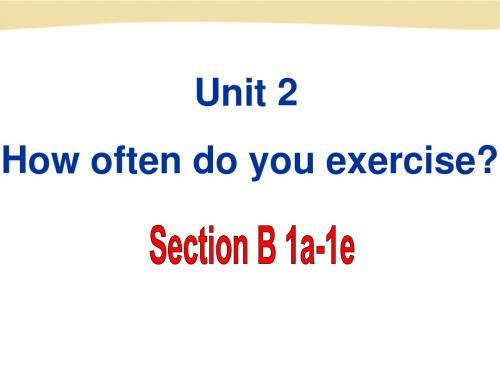
be good for 对„„有好处 Milk is good for your health. 牛奶对健康有好处。
be bad for 对……有坏处 Hot dog is bad for your health. 热狗对我们的健康有坏处。 be good at 在……擅长 He is good at swimming. 他擅长游泳。
She never
Her lifestyle is better.
She
She
nine hours every night. She looks after her health. She is very healthy.
Who can get better grades?
Her healthy lifestyle helps her get good grades. Good food and exercise help her to study better.
A: How often do you drink milk, Liu Fang?
B: I drink milk everyday.
A: Do you like it?
B: No. But my mother wants
me to drink it. She says it’s good for my health.
I eat it once a week.
Do you like it?
Yes. But my mother doesn’t let me eat it. She says it’s bad for my health.
How often do you drink/eat…?
I eat …
新目标(人教) 八年级下册英语教学课件 Unit2 Section B(1a-1e)
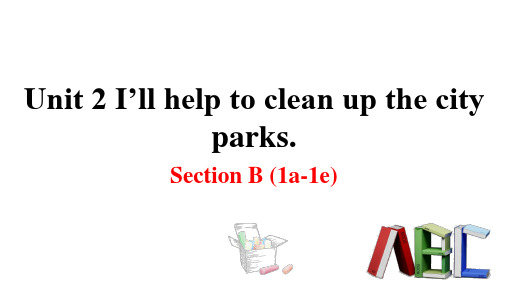
I guess so. But I’ve run out of my money, so I can’t buy any more old bikes. I need to come up with some way of getting money or I’ll have to stop.
1.I’ve run out of it. run out of = use up 意为“用完”、“卖光”。
2. What’s Jimmy doing?
b He is fixing up the bike.
1. What does the boy find? He finds an abandoned(废弃的) bike.
2. Does the bike have a broken wheel?
c Yes, it does.
➢ Have you ever helped others as a volunteer?
➢ What do you want to do if you are a volunteer ?
1a Match the sentences with similar meanings.
__b__ 1. I’ve run out of it.
my bike money my father old clothes
I gave away my bike to a children’s home. _I_h_a_v_e__r_u_n_o_u_t__o_f _m_o_n_e_y__d_u_r_i_n_g_m__y_v_a_c_a_t_ion. _M__y_b_r_o_t_h_e_r_t_a_k_e_s_a_f_te_r__m_y__f_a_th_e_r_._______ _I_f_ix_e_d__u_p__m_y__b_ik_e__y_e_s_te_r_d_a_y_.___________ _I_d_e_c_id_e_d__t_o_g_i_v_e_a_w_a_y__m__y_o_l_d_c_l_o_th__es__to___ _th_e__c_h_il_d_r_e_n_’s__h_o_m_e_.___________________ ____________________________________ …
人教版八上Unit2SectionB(1a1e)教学设计
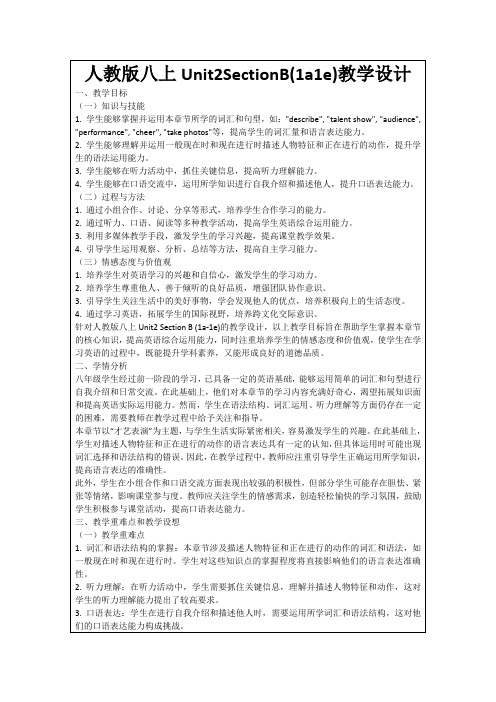
4.词汇巩固:学生完成一份词汇练习,包括本节课所学词汇的拼写、词义匹配等,巩固词汇记忆。
5.家庭作业:教师布置一份综合性作业,要求学生结合所学知识,设计一个才艺表演的海报,包括表演者、表演内容、时间、地点等信息。鼓励学生发挥创意,运用所学英语知识。
6.课后反思:学生撰写一篇课后反思,总结自己在课堂学习中的收获和不足,并提出改进措施。
7.互动交流:学生利用网络平台,与同学分享自己的才艺表演视频和课后阅读感悟,互相学习、交流,提高英语实际运用能力。
2.听力理解:在听力活动中,学生需要抓住关键信息,理解并描述人物特征和动作,这对学生的听力理解能力提出了较高要求。
3.口语表达:学生在进行自我介绍和描述他人时,需要运用所学词汇和语法结构,这对他们的口语表达能力构成挑战。
(二)教学设想
1.创设情境,激发兴趣:结合才艺表演这一主题,教师可以设计生动有趣的情境,让学生在角色扮演中自然地运用所学知识,提高学习积极性。
4.针对学生的薄弱环节,教师进行有针对性的辅导,提高学生的语言运用能力。
(五)总结归纳
1.教师引导学生回顾本节课所学的内容,总结一般现在时和现在进行时的用法,以及描述人物特征和动作的词汇和句型。
2.学生分享自己在课堂中的收获和感悟,提高学生的学习成就感。
3.教师强调本节课的学习重点,布置课后作业,要求学生运用所学知识进行实际操作,巩固所学。
2.学生能够理解并运用一般现在时和现在进行时描述人物特征和正在进行的动作,提升学生的语法运用能力。
3.学生能够在听力活动中,抓住关键信息,提高听力理解能力。
- 1、下载文档前请自行甄别文档内容的完整性,平台不提供额外的编辑、内容补充、找答案等附加服务。
- 2、"仅部分预览"的文档,不可在线预览部分如存在完整性等问题,可反馈申请退款(可完整预览的文档不适用该条件!)。
- 3、如文档侵犯您的权益,请联系客服反馈,我们会尽快为您处理(人工客服工作时间:9:00-18:30)。
2. have a fight with sb=get into a fight with sb 与某人打架
I had a fight with my best friend yesterday.昨天 我和我最好的朋友打架了。
3. compete v. 竞争;对抗 compete with 与……进行竞争 We can't hope to compete with such a experienced team. 我们没有希望与如此经验丰富的队竞 争。
______ ✓ My parents give me a lot of pressure about school. ______ I don't get enough sleep. ______ ✓ I don't have enough free time. ______ I had a fight with my parents. ______ ✓ I have to compete with my classmates at school.
细解巧练31页单项选择
Unit 4 Why don't you talk to your parents?
Section B 1a-1e
1. To learn how to talk about problems and give advice. 2. To learn new words: member, pressure, compete…
1d
Listen again. What advice does Alice give to Wei Ming? Fill in the blanks.
1. Although you may be_________ unhappy with your parents, you should talk to them. Ask them why they give you so pressure much___________. grades Free time 2. Life shouldn't just be about ________. sports and hanging out with friends are activities like_______ important, too. compete with your classmates to get 3. You shouldn't_________ helping each other to better grades. You should all be _______ improve.
1. pressure n. 压力 (不可数名词)
Never give him a lot of pressure about school , just encouragement. 不要给她太多的学习压力,多一些 鼓励。 put pressure on sb 向某人施加压力 under pressure 处于压力之下
1a
______play sports 做运动 ______hang out with friends 和朋友闲逛 ______talk to parents or other family members 和父母或其他家庭成员说 ______ spend time alone 独处 ______ play computer games 玩电脑游戏 ______ read books 读书 ______ watch movies 看电影
A: What's wrong with the boy? B: He has too much pressure.(太多压力)
A: What should he do? B: He could/should...
1c
Listen and check (✓) the problems Wei Ming talks about.
1. be unhappy with sb/sth对...感到不满意 2. free time activities 业余活动 3. help each other 互相帮助
Pair Work
A:What's the matter with you?/ What's wrong with you? B:problems in 1c. What should I do? A: advices in 1d.
What's wrong with the boy? He has too much pressure.(有太多压力) Whatsten to music.
He could go fishing.
What other things could he do to lower stress? (他还可以做哪些事情减小压力)
